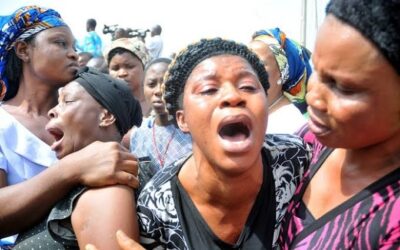Efforts and Failure
“As a response to the escalating crisis in Darfur, the United Nations Security Council, by its resolution 1556 (2004) on 30 July 2004, assigned some additional tasks to UNAMIS relating to Darfur”.
The African Union role in Sudan emerged from October 2004; the African Union Peace and Security Council mandate authorised troops in Darfur to monitor the ceasefire. This mandate according to international community and the media is what lead to the crumble of the African Union in Darfur. The Sudanese Sunday Tribune of May 2008 reported that the African Union has broken their peacekeeping protocol, rather than follow the recommendations of its own assessment team to enter Darfur in the role of a protector, the African Union mandate called only for troops to serve as monitors of the crumbling ceasefire, a concession insisted upon by the Sudanese government. The newspaper alleged thus:
“The Sudanese government has been accused of financing and supplying the militia responsible for much of the violence in the crisis. The government have fought tooth and nail to keep interference from outside the country and continent at a minimum”.
The idea of operations of the African Union was deeply flawed from the outset and it has been deemed failure even before the start of the operation and according to the findings of a notable UN envoy to the region ‘John Predargast’, who was deeply involved on the fight to end human rights crimes in Africa; he said at the time, during one of his visit to Darfur in 2006. For Prendergast; ‘…by authorising a mandate that only was focussed on cease-fire observation rather than protection of civilians, it minimised the objectives of the force and rendered it largely irrelevant. By failing to stand up to the government of Sudan, the African Union gave up responsibility to quell the violence, which has lead to an estimated 2000,000 deaths’.
Consequently, because of all the trial and tribulations of the African Union in Sudan, the United Nations decided to form an alliance with the African Union, and UNAMID was created in July 2007 – (African Union/United Nations Hybrid operations in Darfur with the adoption of the Security Council Resolution 1769. However, on the 31st July 2008, the UN Security Council extended UNAMID’s mandate for further 12 months to 31st July 2009 and the again on the 6th August 2009, for a further 12 months to 31st July 2010.
In May 2010, the Sudanese Sunday Tribune newspaper reported a daunting story; titled: ‘African Union undermine peace process’, only this time the story was very detailed and well documented. The paper explained how the Darfur peace process has been undermined because of the attitude and approach of the African Union and the United Nations, their report was based on the collections of facts (information) from rebels and culprits:
“The peace process has been weakened by the African Union and the negative interferences of the international community, said the spokesperson of the rebel ‘Justice and Equality Movement (JEM). JEM two days ago froze its participation in the peace process held in the Qatari capital Doha, after the signing of a framework agreement on 23rd February. In March 2009 JEM had suspended its participation in Doha process accusing Khartoum of violating a good-will agreement signed in February 2009. Ahmed Hussein Adam said the peace process in Doha has been turned to a tribune for political manoeuvring in a way to present the Sudanese President as peace lover seeking to resolve Darfur conflict peacefully. But in fact Khartoum does not desist from the military option and does not want to deal with the root causes of the conflict, but simply seek to absorb rebels within the regime of the National Congress Party”.
The newspaper went further into more detail story that the mediation led by Mr. Djiril Bassole has been weakened because he does not have the support of the African Union. Mr. Jean Ping – Chairperson of the African Union Commission who has strong relation with the Sudanese President and that he seeks to protect Omer Al-Bashir. The paper sums up that this is one of the main reasons why the African Union lost its strength in Darfur.
7. Genocide or ethnic cleansing?
Genocide in effect can be termed as the gravest crime against humanity. In another phrase, a mass extermination of a whole group of people, an attempt to destroy an entire group and wipe them out of existence; but the most acceptable definition of genocide is the United Nations Convention of December 1948, which came to effect in January 1951; (Convention on the Prevention and Punishment of the Crime of Genocide, N.Y, 1948) which described genocide as follows:
Article Two of the convention defines genocide as ‘any of the following acts committed with intent to destroy, in whole or in part, a national, ethnic, racial or religious group, as such’:
- Killing members of the group
- Causing serious bodily or mental harm to members of the group
- Deliberately inflicting on the group conditions of life calculated to bring about its physical destruction in whole or in part
- Imposing measures intended to prevent births within the group
- Forcibly transferring children of the group to another group
Consequently, the convention also imposes a general duty on states that are signatories to ‘prevent and punish’ genocide. However, since its adoption, the United Nations treaty has come under fire from different sides, mostly by people frustrated with the difficulty of applying it to different cases – www.un.org/millennium/law/iv-1.htm
A number of notable people in the world suggest that the atrocity committed in Sudan by the government of Al-Bashir is nothing less than genocide; an initial report from the United Nations in 2006 estimated a staggering 3,000 women and children were killed or displaced during the first half of the war period, another report released by the Sudan Tribune was in the tune of 6,000 people, excluding over 2,182 women and children who were killed in the massacres. The UN humanitarian coordinator for South Sudan, Lise Grande, said at the time that she feared ‘tens, perhaps hundreds’ could have died.
In a damning report of July 2005, another Sudan networks radio station reported that there is ongoing genocide in Darfur, African farmers and others in Darfur are being systematically displaced and murdered at the hands of the Janjaweed, a government-supported militia recruited from local Arab tribes. The genocide in Darfur has claimed 400,000 lives and displaced over 2,500,000 people. More than one hundred people continue to die each day; five thousand die every month. (www.darfurscores.org/darfur)
As for the most prominent of the word “genocide” in connection with Darfur, the former USA Secretary of State ‘Colin Powell’ seems to have based himself on the 1948 conventions’ definition of genocide, when he said on the 9th September 2004 that in his opinion Darfur was genocide. For Powell “…We concluded that genocide has been committed in Darfur and that the government of Sudan and the Janjaweed bear responsibility and genocide may still be occurring”. Also in that category was the former President of the USA, George W. Bush; who simply declared, ‘our conclusion is that genocide is on the way in Darfur’.
Gerard Prunier (2005) was not left behind; though he was a bit cautious with his findings of genocide in Darfur; he seems to be sitting on the fence with the issue of genocide, claiming that numbers matters:
“The number of victims is definitely not a key factor in deciding if large-scale killing constitute a genocide or not. However, numbers are relevant first in themselves (but the magnitude of what the targeted group has suffered) and secondly because of their real and potential impact on world opinion. In the case of Darfur, these numbers have been both extremely difficult to compute and as is usual in such situations, have been the object of fierce differences of opinion”. Prunier; (2005: pp148)
He concluded that any discussions of numbers of deaths, displaced individuals, refugees and war-affected population in Darfur since February 2003 must start with a short history of how these numbers were arrived at and disseminated. This study concluded that there was genocide in Darfur, and the government of Al-Bashir is responsible. Going by all the analyses and evidences available for this study as highlighted and explained above; the Sudanese government and the culprit (Janjaweed) must be held responsible and question must be answered, Darfur was a coordinated and calculated ethnic cleansing, tantamount to genocide.
7. The role of the ICC (efforts and failure)
“Significantly, it is imperative to know that this is the first time of which the ICC (prosecutor) will made charges against a sitting President, breaking new ground in the reduction of national sovereignty rights that have characterised international law over the years”. (www.news.bbc/world-africa)
The International Criminal Court came into force in July 2002, ICC is a permanent tribunal to prosecute individuals for genocide, crimes against humanity, war crimes, and the crime of aggression. In March 2009, the Sudanese President Omer Al-Bashir was indicted but he was not arrested. He was accused over the crisis in Darfur; where over 500,000 people are said to have died in the seven years of fighting. Though the ICC had initially decline to add genocide to the indictment but this has been overturned on appeal, with the judge finding, “…there are reasonable grounds to believe that he is responsible for three counts of genocide”. – (www.news.bbc.co.uk/world/africa)
On the 12th July 2010, a second warrant was issued on Al-Bashir; However, despite the fact that Al-Bashir is the first sitting President or Head of State to be on trial by the ICC, up till today he has not been arrested, he is still At-large. Bellow is the ICC dossier on Al-Bashir:
- 14 July 2008: Prosecution application for warrant of arrest
- 4 March 2009: First warrant of arrest issued
- 12 July 2010: Second warrant of arrest issued Counts: Mr Al Bashir is allegedly criminally responsible for ten counts on the basis of his individual criminal responsibility under Article 25(3)(a) of the Rome Statute as an indirect (co) perpetrator including:
- five counts of crimes against humanity: murder – Article 7(1)(a); extermination – Article 7(1)(b); forcible transfer – Article 7(1)(d); torture – Article 7(1)(f); and rape – Article 7(1)(g);
- two counts of war crimes: intentionally directing attacks against a civilian population as such or against individual civilians not taking part in hostilities -Article 8(2)(e)(i); and pillaging – Article 8(2)(e)(v).
Perhaps the ICC has also failed in its role to prosecute the main actors responsible for the massacres in Darfur. Darfur genocide reports was sent to the ICC by the United Nations Security Council since 2005, following a United Nations commission of inquiry which found that crimes against humanity and war crimes had been committed by government forces and their co-accused (the Janjaweed). This gave the prosecutor a strong incentive to carry out an investigation into atrocities there; but rather, the ICC relies on others to help arrest Al-Bashir.
Consequently, part of the failure of the African Union and the United Nations in Darfur is the ability of the African leaders to shield Al-Bashir and his co-allies from the judgment of international community. According to the BBC reports of October 2011; Al-Basir arrived in Malawi for a meeting with other African leaders, the Malawi government failed to arrest him; which lead to the ICC demanding to know why he was not arrested by the Malawi government. But the Malawi government claimed that Al-Bashir arrest is not their duty and it’s not their problem. This case is now with the ICC – as seen in – www.icc-cpi.int:
“Today, 12 December 2011, Pre-Trial Chamber I of the International Criminal Court (ICC) decided that the Republic of Malawi failed to cooperate with the Court by not arresting and surrendering Omar Al Bashir to the Court during his visit to Malawi on 14 October 2011. The Chamber decided to refer the matter to both the United Nations Security Council and the Assembly of States Parties to the Rome Statute, founding treaty of the ICC”.
All the efforts of the ICC have no significance effect on other African leaders; who has continuously protecting the accused person. Perhaps this is due to the African Union connections. The African Union has also lobbied for the arrest warrant to be deferred, accusing the ICC of only investigating alleged war crimes in Africa and arguing that arresting Sudan’s president would hamper the search for peace in Darfur. According to the BBC reports of October 2011, ‘Mr Al-Bashir was welcomed by a military guard of honour when he arrived in Malawi for a trade summit’. This is an indication that the African Union and the African leaders were to be held responsible for the failure of both the United Nations and the ICC on Darfur peace solution.
8. Conclusion
“In its attempt to construct zones of ‘stable peace’, the theory and practice of peacekeeping is informed by a commitment to the liberal peace. Democratic peace theory is based on the observation that democratic states do not wage war on each other”. Boulding 1978;
Doyle 1988; Levy 1988) This study conclude that if there is going to be a lasting peace in Darfur, there has to be an adequate government in place to cater for the liberation of the people of Sudan. People should learn to live together, but the atrocities committed by the present government might put a stumbling block in the way to achieve a peace deal. However, the African Union and the African leaders should start taken responsibility and stop all their insolence and inappropriate attitude towards a peace deal in Darfur.
But above all; the good work of ‘E.H. Carr’, (The Harmony of Interests); reveals that; ‘…no political society, national or international, can exist unless people submit to certain rules of conduct; the problem why people should submit to such rules is the fundamental problem of political philosophy’. Therefore, it is imperative that all hands must be on deck for a lasting deal and peace to reign in Darfur. The United Nations, the African Union, the ICC have all failed the people of this region during the trying and difficult time, the United Nations Security Council – who has the primary responsibility under the UN Charter, for the maintenance of international peace and security should all step forward and find a lasting solution to Sudan’s problem.
Finally, going by the purpose of the United Nations and the content of Article 1 of the UN Charter, it says; “…to maintain international peace and security, and to that end: to take effective collective measures for the prevention and removal of threats to the peace, and for the suppression of acts of aggression or other breaches of the peace, and to bring about by peaceful means, and in conformity with the principles of justice and international law, adjustment or settlement of international disputes or situations which might lead to a breach of the peace”. Therefore, the time is now, to find a lasting solution, to the region of Sudan.
Darfur – a desert region, roughly the size France; has about seven significant rebel faction, who took up arms, claiming the region had been neglected and marginalised, but are divided in their loyalties. There have been many broken agreements in the past and there are huge obstacles ahead.
Search for Peace in Darfur
Bellow are few of the numerous and substantial problems that exist in Darfur till today; as a consequence of the various peace deals that has either broken, collapse or not adhered to: – BBC library
May 2006: Khartoum makes peace with the main Darfur rebel faction, Sudan Liberation Movement; JEM rejects the deal.
May 2008: Unprecedented assault by JEM on Khartoum
July 2008: ICC calls for the arrest of President Al-Bashir
November 2008: President Al-Bashir announces ceasefire
November 2008: ICC calls for arrest of three rebel commanders
February 2009: Army claims its captured key town of Muhajiriya February 2009: Khartoum and JEM sign a deal in Qatar
July 2010: ICC issue second warrant of arrest for Al-Bashir
January 2011: ‘Jehanne Henry’, Sudan Researcher at Human Rights Watch calls for international help: “There are clear signs that the situation in Darfur is getting worse. But the international community is failing to monitor and respond properly to what is happening in Darfur”. www.hrw.org/news/sudan-deteriorating
August 2011: A Sudanese court sentenced to death by hanging a leader in the rebel Justice and Equality Movement, (JEM) which carried out attacks against the army in Southern Kordofan – www.sudantribune.com
January 2012: ‘Dmitry Titov’; the UN Assistant Secretary General, voice his concern during his 6 days visit to Darfur to review UNAMID activities in the region; “…more can be done to achieve justice and reconciliation in Darfur”



